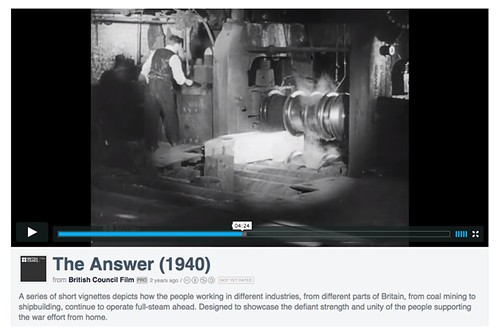There are literally millions of free media resources for use in education. Theo Kuechel introduces some of them, with suggestions on how they might be used not only within the Computing curriculum but also more generally.
I was delighted to read, via an email from Terry, (our editor), that UNESCO has announced a World Day for Audiovisual Heritage to be held on the 27th of October this year. This timely initiative seeks to draw attention to the urgent need to preserve the worlds audiovisual heritage of film, television and sound recordings. Why this so important is graphically illustrated in this short video.*
 An example of a film in the British Council archive
An example of a film in the British Council archive
Once rescued by digitisation and made accessible online, media archives offer teachers unlimited opportunities to work with primary sources. They are a window to our past; enabling students to experience an authentic connection with history. Many schools will be participating in the current WW1 commemorations, and for them, the recent increase in digitisation has been a godsend with many sites offering a rich choice of images and videos relating to this period in our history. A good example is this contemporaneous film shows the outbreak of WW1 from a German perspective. We may ask, how does this compare the British viewpoint as presented in the media at the time?
In a similar vein there are some fascinating films in the British Council’s collection which provide a ‘snapshot’ of life in Britain in the 1940’s, as the British Council explains:
“The British Council Film Collection is an archive of over 120 short documentary films made by the British Council during the 1940s designed to show the world how Britain lived, worked and played. Preserved by the BFI National Film Archive and digitised by means of a generous donation by Google, the films are now yours to view, to download and to play with for the first time.”
There is now a growing trend for Museums and Archives to place their digital assets in the Public Domain, for example the British Library has uploaded over one million images to Flickr Commons, whilst within the past week, 2.3 million images from the Internet Archive book collection have also been added to the Commons. These are already generating worldwide interest, as folk play and experiment with new and exciting uses for them.
Of course archive resources are not just about History, they can be used in ways that go way beyond simply illustrating an idea or concept, especially If they are included in learning frameworks and designs. They can encourage students to develop higher-order thinking and analytical skills; for example what are have ships logs to do with climate change?
If made available using open licences, such as those proved by Creative Commons, digital media assets can be adapted and developed by teachers and students to create new learning resources and artefacts. Indeed teachers can use them in all sorts of creative and innovative ways to enhance their teaching and learning across all curriculum areas through the:
- discovery of resources that can be used freely and safely in all curriculum areas
- teaching research skills through contextual analysis, for example the 100 Objects project, (an idea that could easily be applied in other subjects)
- enabling our world today to be viewed through a historical and cultural lens
- facilitating curation, metadata and tagging skills - as in this online game
- encouraging critical thinking
Although it may not seem obvious at first, media archives are also highly relevant for the new UK Computing curriculum. They can:
- foster digital literacy through engagement with online media
- develop computational thinking through a systematic analysis of digital artefacts
- offer a context for ICT and Computing capability, coding and web skills
- facilitate remixing. repurposing and sharing digital media
- help educators and students gain a practical and usable understanding of Copyright and IP, an area often overlooked
I will be illustrating these in more detail in an Open Digital Toolkit launched in during September 2014, this will hosted on a wiki platform, which will be available free under a Creative Commons Licence.
Unfortunately many of the fascinating examples in the UNESCO Multimedia Archive showcase, have copyright restrictions, (they can only be viewed directly on the site, or embedded in a web page by requesting the ‘code’), but I am pleased to include the following links, to some more open media resources which can be edited and re-purposed:
Open Images from the Netherlands Institute for Sound and Vision is an open media platform that offers online access to audiovisual archive material to stimulate creative reuse
- The British Council have released a number of films provided a ‘snapshot’ of life in Britain during wartime in the 1940’s
- The Internet Archive’s Moving Image portal with over 1.7 million items which includes historic footage, documentaries, experimental film, advertising, ephemera, and news items
- Although it has not been updated recently, the open video project http://www.open-video.org/ offers a large number of video resources
One can also find more contemporary material that is Creative Commons licensed here:https://archive.org/details/movies
- Vimeo Creative Commons Licensed works http://vimeo.com/creativecommons
- Mazwai: http://mazwai.com/#index
Finally, I hope ICT in Education readers will take the opportunity to share the UNESCO audiovisual heritage day and raise awareness of resources available online, that others might not be familiar with, and of course any educational practice or activities created as a result of this initiative. If you can share your resources and teaching ideas on the Open Content Toolkit with others, especially those suitable for the Primary sector, that would be great.
About Theo Kuechel
 Theo KuechelWith a background in teaching art and ICT, Theo is an educational consultant and researcher with a special interest in digital literacies, visual learning and open content. His expertise and specialisms include visual literacy, online video for learning and digital archives/collections. Theo is currently developing a toolkit of strategies, learning frameworks and activities that can help schools, educators and students discover, and take advantage of, the growing wealth of open digital content and resources available online. Please contact Theo to learn more or become involved in the project, read blog posts by Theo, or find his contact details.
Theo KuechelWith a background in teaching art and ICT, Theo is an educational consultant and researcher with a special interest in digital literacies, visual learning and open content. His expertise and specialisms include visual literacy, online video for learning and digital archives/collections. Theo is currently developing a toolkit of strategies, learning frameworks and activities that can help schools, educators and students discover, and take advantage of, the growing wealth of open digital content and resources available online. Please contact Theo to learn more or become involved in the project, read blog posts by Theo, or find his contact details.
This article first appeared in Digital Education, the free newsletter for those with a professional interest in educational ICT and Computing. One of the benefits of subscribing – apart from access to unique content – is articles in a timely manner. For example, this article was published in the edition of 3 October 2014. To sign up, please complete the short form on our newsletter page. We use a double opt-in system, and you won’t get spammed.
* Editor's note: Please note that in the original article, I mis-copied this link. The one included here is the correct one!
